- Home
- Mark Pryor
The Book Artist Page 2
The Book Artist Read online
Page 2
“Protocol.”
“Right, protocol. Not something Tom was ever a fan of.”
“Even back then?”
“Especially back then.”
“So I’m guessing he didn’t want to wait.”
“One of them tried to get away, came out the back and saw Tom. Drew on him. Tom shot him dead.”
“Hugo, it’s me. Be honest. Is that the real story or the official one?”
“Ah, your BS detector going off, is it?”
“Loud and clear.”
Hugo couldn’t help but smile. Taylor’s no-nonsense attitude had always been a breath of fresh air in the diplomatic world, where hedging and half-truths were the norm. Hugo himself was prone to inopportune outbursts of truth-telling, so he appreciated his boss’s insistence on it now.
“Fine,” Hugo said. “Since you insist. I was waiting in front of the house, like I said. I heard a gunshot and ran across the yard, then followed the veranda around to the back.” Hugo felt his heart take an uptick at the memory. It was so clear to him, the sound of that shot, the thick Houston air that wrapped itself around the house, and around him, like a wet cloth. And the rising dread that Tom had done something unnecessary. “When I got there, Tom was just inside the doorway, and one of the two men inside was dead.”
“Just to be clear, Tom shot him? It wasn’t suicide.”
“It wasn’t suicide, no.”
“And what happened then?”
“Well,” Hugo took a breath. “I made sure the second guy was secure, and we waited outside the house for backup to arrive.”
“All four of you were outside when they got there.”
“Correct.”
“I see.”
Yes, what you see is that Tom moved the body to make it look like the guy was escaping. And I didn’t stop him.
Ambassador Taylor continued with his questions. “So one of them was dead, and the other?”
“Rick Cofer is his name. He was taken into custody and went to prison, eventually. And then parole.”
“After robbing a bunch of banks and killing people?”
Hugo grimaced. “Well, we only had proof of that one robbery. And let’s just say that as a result of that afternoon, with Tom going off the reservation, the US Attorney’s Office wasn’t wild about taking the cases to trial. Cofer got a great deal, but waived all appeals and also any civil suit against the government.”
“Against you.”
“I’d like to think it’d be against Tom, but yeah.”
“I’m missing something here.” Taylor frowned, and Hugo could hear the wheels turning in his mind. “One bad guy dead, the other in prison and now paroled. Are you telling me that this Cofer guy is in Amsterdam and Tom is chasing him?”
“It’s kind of the other way around—Tom thinks Cofer came over here to do us harm.”
“But why? He robbed the banks, he killed Tom’s sister. You were just doing your jobs—why would this be so important to him after all this time? Why take it so personally?”
“Yeah, you are missing something. Cofer is taking it personally because he saw Tom execute his partner in crime in that house. . . . That partner in crime happened to be his twin brother.”
“Ah. I see now,” Taylor said quietly. “That explains things a little better.”
“I had Tom on the phone earlier. He mentioned the hotel room you heard about. He said it was Rick Cofer’s.”
“Look, Cofer might be there, but that wasn’t his hotel room.”
“How do you know?”
“The US federal government has started to use that hotel, just in the last year. The room Tom broke into was being used by . . . let’s just say, an American on a diplomatic mission.”
“One of your spook types, you mean.”
“Normal security captured a man going through the room, and it took another ten seconds to ID Tom.”
“He’s convinced Cofer is there.”
“And he may be. But that wasn’t his room.”
“I can try to summon Tom back, boss, if that’s what you’re asking me to do.”
“Good lord, no,” Taylor guffawed. “Tom doesn’t listen to his superior officers at the best of times; I can’t imagine he’d listen to you ordering him back to Paris. Not when he has the bit between the teeth.”
“So, what do you want me to do?”
“About Tom? Not a damn thing. Go out there and help him if you want, but other than that I don’t expect anything of you. I just wanted to know what the hell was going on.”
“And now you do.”
“Thank you for that. I also want to know the minute you think Cofer is in Paris, should that happen.”
“Fair enough,” Hugo said.
“Good.” Hugo could hear Taylor stand up and take a deep breath. “Now, then, you’re on your way to get my guest?”
“Yeah, and I’m thrilled to be chaperoning a blowhard politician too incompetent to find her way to her own embassy.”
Taylor laughed. “Then you’ll be delighted to hear that you’re actually meeting a young artist visiting from the United States. She had an art exhibition in DC, and the Dalí Paris museum has sponsored her to bring it here.”
“An artist? I’m not much into painting, but it’s definitely an improvement on politics.”
“Sculpture, actually, it’s very modern, very good. Opening night for her show is tomorrow. I’ll be going and so will you.”
“Thanks for thinking of me, but I do books, not art. Especially sculpture. And doubly especially not modern sculpture.”
“Yes, I thought you might say that, but that’s why I wanted you to meet her. I mean, apart from the fact that she’s indescribably beautiful. I thought you’d make an exception from your narrow-mindedness about art because her sculptures are all made out of books. Really, it’s very clever.”
Hugo wasn’t sure he’d heard right. “Made out of books?”
“Yep, books.”
“Interesting. And indescribably beautiful, you say?”
“I do.”
CHAPTER THREE
Alia Alsaffar was staying at l’Hôtel Toby on Rue Joseph de Maistre, right beside the Montmartre Cemetery. Hugo asked the taxi driver to wait, then stepped out into the cold and through the sliding glass doors of the hotel into a modern, surprisingly spacious lobby. Most hotels in Paris were small, somewhat cramped, but this lobby area was bright and open, with couches and what looked like a small library to his right. He saw no obvious reception desk, just two well-dressed employees, a man and a woman, right ahead of him, perched atop stools on either side of a grand piano. They both looked up from their electronic notebooks.
“Bon soir, monsieur,” the young man said. “Are you checking in?”
“Non,” Hugo said, taking off his hat. “I’m here to pick someone up, a guest. Alia Alsaffar.”
The two clerks exchanged quick glances, then the young man spoke. “Mademoiselle Alsaffar just left. Two minutes ago.”
“She left?” Hugo was surprised—Taylor had told him she was expecting him.
“Oui, monsieur”
“Do you know where she went? I’m from the US Embassy, and I am supposed to be driving her there.”
The young woman pointed to the front doors. “She went left, along Rue Joseph de Maistre. Her . . . friend left, too.”
Friend? Hugo thought. Taylor never mentioned a friend. He read the clerk’s expressions, and made a deduction from the fact that not only had Alsaffar left, but she and . . . whoever it was, had gone in opposite directions.
“They were arguing?” he asked.
That glance again, wondering this time whether they were violating a guest’s privacy. The young woman looked down, and her colleague just shrugged.
“Can you tell me what she’s wearing?” Hugo pressed. “I’m responsible for her safety.”
“Black boots, jeans, and a red jacket. And a red hat,” the young man said, a little too quickly for his colleague’s liking, apparently.
That’s a yes, then, Hugo thought. “Merci,” was all he said, though. He put his hat back on and braced himself for the cold, then exited the automatic doors and hurried back to the cab. He directed the taxi driver to take him up the street Alsaffar had gone. They drove slowly, but after a hundred yards or so Rue Joseph de Maistre arrowed into Rue des Abbesses.
“It’s one-way, monsieur,” the cabbie said. “I have to turn left, but the restaurants, and probably your friend, are to the right.”
“Merci,” Hugo said, and he hurriedly paid the man. He climbed back out into the cold and looked along the street. This was one of the major arteries that kept the area of Montmartre alive and ticking. A narrow street, yes, but normally pulsing with activity, throbbing with tourists and vendors, all competing for each other’s attention, and money. It was one of the streets that took visitors toward the Sacré-Coeur Basilica at the summit of the butte Montmartre, the most prominent landmark in that part of Paris, and probably the best view of the city from anywhere except the top of the Eiffel Tower. Here, in spring, summer, and autumn, the three times Hugo had visited, he’d been irritated at the crush of people, and the garbage they bought as mementos.
But that was the wonderful thing about the cold, the rain, and the weeks before Christmas. With the tourists all but gone, Paris lapsed into her old habits, shrank into the assortment of villages she’d once been. This was especially true of Montmartre, because it was normally one of the busiest parts of the city. The crêpe vendors still plied their trade, but they looked unhurried, had time to nod bonjour to the locals and enjoy the rich aromas of their own delicacies as they sizzled on the hotplates in front of them. In this rain and cold, it struck Hugo as he walked, that Montmartre had had returned to its people, with the gleaming, cobbled streets uncrowded, more homely and welcoming.
And tonight Rue des Abbesses was quiet, almost empty. The sidewalks were wide and the road narrow, and on either side shops and restaurants snuggled cozily against each other. The small, tightly packed cobbles glistened with the rain, giving off a warm glow from the soft lights of the buildings overlooking the street.
He saw not a woman in red but just a few couples wandering along, arm-in-arm, and a handful of others who lingered at the glass storefronts. He set off, his breath steaming in front of him. He had no idea where she was going, but Ambassador Taylor had mentioned the Dalí museum, which was in the direction he was headed. He checked his phone to make sure of that, and his stomach growled as he passed the entrance to a bistro called Le Sancerre, where the rich aroma of garlic hovered like a siren tempting him inside. He settled for a glance at the menu as he passed by, and the words escargots and canard caught his well-trained eye—snails in garlic butter and duck, two of his favorites on the same menu.
Duly noted, he thought as he kept going.
A flash of red fifty yards ahead caught his eye, someone coming out of a store. He quickened his step and was soon close behind her.
“Excuse me, Ms. Alsaffar?”
She stopped and turned, her large, and very beautiful, eyes wide with surprise. The ambassador had not exaggerated. Alia Alsaffar was gorgeous, even wrapped up against the cold. Thick, wavy, black hair flowed out from the wool hat she wore, and in the low light her olive skin seemed to shimmer. And Hugo couldn’t tear his gaze away from those hazel eyes.
“My name is Hugo Marston. The ambassador sent me.”
“Sent you?”
“To bring you to the party. At the embassy.” He smiled. “Right now.”
A hand flew to her mouth. “That’s tonight? Oh, sh— . . . damn it. I totally forgot.”
“That’s OK, we can still make it.”
“I’m sorry, what was your name again?”
“Hugo Marston. I’m the RSO at the embassy.”
“What’s an RSO?”
“Regional Security Officer. In plain English, I’m head of security there.”
He offered his hand and when she slipped off a glove and took it, Hugo forgot what he was about to say, at a complete loss for words. It was a sensation he’d not experienced in years. Not since he’d met Claudia in a random encounter at a café near his apartment.
“Well, Mr. Marston, I’m not exactly dressed for an embassy Christmas party, now am I?”
“I can wait while you change, if you like. And, please, call me Hugo.”
“Hugo. I like that name.”
He was glad to be in the dark because he felt himself blushing, just a little. Also something he’d not experienced in years.
“Thanks, so did my parents. They were fans of Victor Hugo.”
“And you?”
“A big reader, yes.”
She snapped her fingers. “You’re the one who collects rare books.”
“That’s me.”
“The ambassador told me about you.”
“Why would he do that?”
She laughed. “I don’t recall, to be honest.”
“Probably for the best.” Hugo gestured back the way they’d come. “Shall we?”
“You know, Hugo,” she said slowly. “I’m not really in the mood for a party.”
“Is there something wrong?”
“A bit of a . . . disagreement with a friend.”
“I’m sorry to hear that.”
“What can you do? It happens.” She sighed. “More and more, it seems.”
“Where were you headed, if you don’t mind me asking?”
She smiled. “You’re very formal, aren’t you?”
He returned the smile. “I’ve been called that before. And worse.”
“Well, originally I was going to just wander through Montmartre, but it’s cold and rainy, so now I’m less excited about that idea.” She looked around, then wiped a drop of rain off the end of her nose. “But it still sounds better than going to a stuffy Christmas party at the embassy. No offense.”
“None taken,” Hugo assured her.
“What about you?” she asked.
“What do you mean?”
“You’re missing the party because of me. Shouldn’t you head back?”
“If I miss it because of you, Ms. Alsaffar, I will be very grateful indeed. Not my kind of thing.”
She laughed. “OK, Mr. Polite, I know you’re on the clock, but call me Alia. And if you’re quite sure about missing the party, I don’t want to get you in trouble.”
“You won’t. The ambassador knows how much I want to be there.”
“Well, good.” She cocked her head and looked at him. “Are you hungry?”
“Actually, I am.”
“Then let me buy you dinner.” She waved her arms in both directions. “We have a plethora of choices, what do you fancy?”
“I did see one place that serves escargots, my particular favorite.”
She wrinkled her nose. “Eww. Snails, right?”
“Right. But it’s all about the fresh bread dipped in garlic butter.”
“I’ll take your word for it.”
“Fair enough. Right this way.” Hugo and Alsaffar started toward the bistro. “I should let my boss know we’re not coming,” he said. “Would you mind finding us a table? I’ll be right in.”
“Of course, take your time,” she said. Then she winked. “As long as they have a fully stocked bar, I’ll be just fine.”
Hugo watched her enter and be welcomed by a waiter, then he dialed Ambassador Taylor. “Everything all right?” the ambassador asked.
“Well, she’s not dressed, and not in the mood. Seems like she had an argument with a friend.”
“So, no special guest for my party?”
“I’m sure some CEO or celebrity will step up.”
“No, it’s fine, I don’t need one. Are you at the hotel?”
“At a restaurant. Why?”
“I don’t know. Do me a favor . . . stay with her until she’s back at her room, will you?”
Something in Taylor’s voice struck Hugo. “Sounds like there’s something you’re not tel
ling me.”
“Yes and no. There was an incident before she left the States. Close call with a car in Washington, DC, that might have been an accident, and probably was. Call it a feeling, but I’d be happier if she wasn’t wandering the streets of Paris by herself. She’s on my turf, and I’ll go the extra mile to make sure she stays safe.”
“If she’s in danger, and I’m with her, I’d kinda like to know, boss.”
“Do this, buy her dinner. Expense it, then escort her back to the hotel. And, hey, you don’t have to come back to the party.”
“Sounds like a good deal for me,” Hugo said.
“Good man.”
Hugo kept the phone in his hand after they’d disconnected; he had another call to make. He took a deep breath and dialed Claudia.
“So, don’t be mad,” he said.
“Hugo, are you serious? You’re not coming.”
“I need to babysit his guest, an artist, I’m sorry. She doesn’t want to come to the party, and I need to stay with her until she’s back at her hotel.”
“What does need to mean?”
“The ambassador asked me to. And you know me, a good soldier who always follows orders.”
“So she’s pretty, huh?”
“That’s your assumption?” Hugo asked, amused.
“Either you or Taylor is playing the protective card pretty hard.” He heard the humor in her voice. “Maybe both of you.”
“He did say she was, and I quote, ‘indescribably beautiful,’” Hugo said.
“And do you agree?”
“She is pretty, yes, and seems very nice. Young, maybe early thirties, but nice.”
“Is that too young or just-right young?”
“Honestly, this is probably a bad time for that discussion,” Hugo said, serious for a moment.
“I know, Hugo. We were supposed to have it here. Tonight.”
“Yes. I’m sorry.” He felt deflated, and now he regretted accepting the dinner invitation. “Really, I’m sorry.”
“And I dragged myself here despite being sick.” He rarely heard annoyance in her voice, but it was there now.

 The Book Artist
The Book Artist The French Widow
The French Widow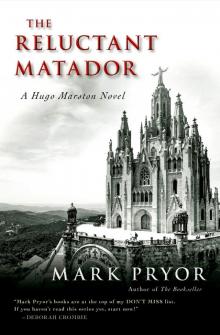 Hugo Marston 04 - The Reluctant Matador
Hugo Marston 04 - The Reluctant Matador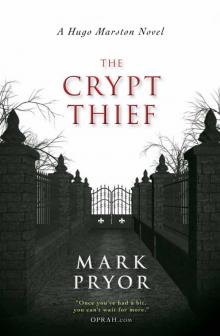 The Crypt Thief
The Crypt Thief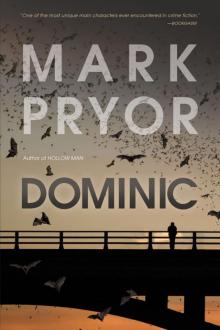 Dominic
Dominic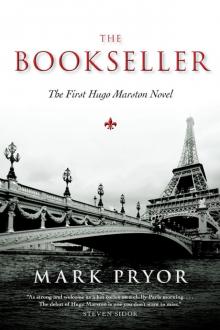 The Bookseller
The Bookseller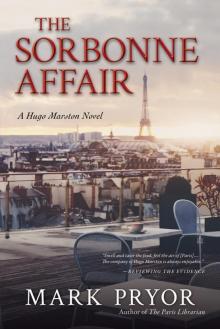 The Sorbonne Affair
The Sorbonne Affair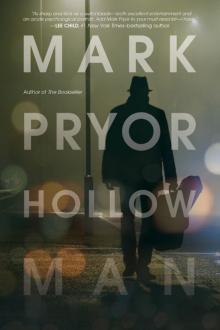 Hollow Man
Hollow Man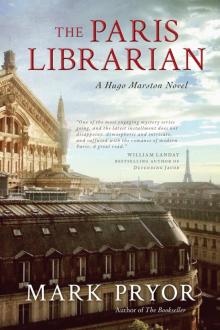 The Paris Librarian
The Paris Librarian